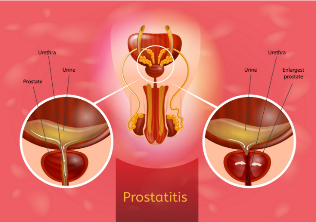Prostate disease the prostate (prostatitis), that develops as a consequence of inflammatory changes. According to the statistics, the disease prevalence reaches 35-50%, and the diagnosed years old male 20-40 years.

More file types to open
Allocate 4 forms of prostatitis:
- acute (bacterial);
- chronic bacterial;
- chronic, non-bacterial;
- asymptomatic chronic.
Acute prostatitis is very rare, because of the rapid course of the inflammatory process is a direct transition to the chronic stage (fake improvement).
Chronic, non-bacterial prostate inflammation, otherwise, it is called chronic pelvic pain syndrome may be inflammatory (the presence in the urine or in the ejaculate, the high content of white blood cells), as well as the non-inflammatory nature.
Reason
The cause of acute and chronic bacterial prostate inflammation or pathogenic micro-organisms (viruses, bacteria, fungi). The most common source of the inflammation or:
- Escherichia coli;
- streptococcus;
- staphylococcusok;
- Proteus;
- Klebsiella;
- Pseudomonas aeruginosa;
- the causative agents of sexually transmitted diseases (chlamydia, Mycoplasma, gonococcus, Trichomonas, cytomegalovirus, and others).
Most of the micro-organism found in the intestines, the skin, but the to the prostate tissue, they cause inflammation. As a general rule, cause of the disease is not a single pathogen, and the Association of the different types of microbes.
The development of chronic prostatitis can trigger the following factors:
- co diseases of the urinary system (cystitis, pyelonephritis);
- sedentary lifestyle (sedentary work);
- prone to constipation;
- the weakening of the protective forces of organism;
- injury;
- hormonal imbalance;
- the excessive consumption of alcohol, Smoking;
- promiscuity;
- irregular sexual life (length of abstinence);
- coitus interruptus;
- irregular emptying of the bladder;
- unmet sexual desire;
- the chronic stress;
- hypothermia;
- the presence of the decayed teeth, as well as other sources of chronic infection (e.g. chronic tonsillitis).
The prostatitis symptoms
Acute prostatitis is a very sneaky disease. The "catch" is pretty difficult, like the first, the process can quickly become chronic, and secondly, most patients prefer to "wait out" the symptoms of acute prostatitis at home. The doctor the patients with prostatitis often advanced cases, the symptoms of erection, and other consequences.
The acute form of the disease occurs in the background:
- high temperature;
- chills;
- other signs of intoxication (weakness, lethargy, loss of appetite, etc.).
The inflammation of the prostate gland accompanied by pain in the perineum, the groin area and the scrotum.
Characterized by painful, frequent urination. Sometimes the urine may have a whitish, purulent discharge.
In addition, the patient also draw attention to the lack of night and morning erections, poor erections during sex, followed by a sharp shortening of the sexual contact.
Signs of chronic bacterial prostatitis may not be available or appear during periods of exacerbation. In this stage, characterized by pain in the groin or lower abdomen, often radiates to the sacrum, lower back and scrotum.
There are the typical symptoms of disorders of urination: weak urine stream, and frequent urination, although the urine you stand out a little bit.
Further, in the absence of treatment of chronic prostatitis reaches its climax: there are diseases, sexual function. For example:
- unsatisfactory erection, or lack thereof;
- painful erection which the patient is placed in the sexual intercourse;
- effacement orgasm;
- short intercourse;
- pain in ejaculation.
Bad general condition in men: get tired quickly, constantly nervous, can't sleep.
Chronic abacterial prostatitis 95% of prostatitis, to hurt them, especially the men, around 30 years. It is characterized by constant or intermittent pain in the pelvic area, the prostate, the scrotum, while the laboratory tests there are no inflammatory signs. Cause of the disease is uncertain.
Diagnosis
The diagnosis of acute or chronic prostate in addition to the collection of complaints, medical history during the patient using the following methods:
- General analysis of blood in the urine;
- microscopic examination of prostate secretion, or planting medium that the pathogen detection (the secret obtained after the finger massaging the prostate through the rectum);
- cytological examination of the urine;
- Ultrasound of the prostate and the pelvic organs;
- computed tomography, and nuclear magnetic resonance imaging (MRI);
- the smear of the urethra, the flora.
Differential diagnosis aims, delineating the prostate inflammation, BPH, prostate cancer, signs, stones in the prostate.
A full list of diagnostic procedures as well as medications, treatment, prostate the Federal standard of care, to from 2012.
Treatment of prostate
The same symptoms can be signs of various diseases, and the disease can occur, not textbooks. Don't try to handle it yourself, talk to your doctor.
Treatment of prostate leads to the surgeon-urologist.
The purpose etiotropic treatment aimed at eliminating the cause of the prostate, the elimination of the pathogen. Depending on the identified, cause antibiotics, antiviral or antifungal medications. The duration of treatment in acute prostatitis 7-10 days, chronic process is 4-8 weeks.
In the treatment of bacterial infections is used for:
- fluoride antibiotics hinolonovogo series (ciprofloxacin, levofloxacin, moxifloxacin);
- macrolides (erythromycin, clarithromycin);
- doxycycline;
- anti-bacterial agents.
Antifungal are assigned to oral, rectal candle.
In addition, there are other types of therapy:
- anti-allergen;
- anti-inflammatory;
- painkiller.
Like:
- physiotherapy;
- therapeutic exercises;
- massage of the prostate.
The full course of treatment is 3-4 months.
Complications
No cure prostatitis dangerous complications of the following:
- obstruction of the bladder, the subsequent acute urinary retention;
- infertility;
- recurring inflammation of the bladder;
- abscess of the prostate;
- depression;
- impotence;
- BPH;
- calculous prostatitis (the stone is so crippling pain);
Forecast
The prognosis of acute inflammation of the prostate a positive, timely treatment leads to complete healing. The frequency especially in the chronic prostatitis reaches above 50%, but the appropriate maintenance treatment can achieve a durable remission.
Prevention
The prevention of disease must meet the following conditions:
- the regular sexual life with the constant partner;
- avoiding harmful habits;
- maintaining a healthy lifestyle (exercise, fresh air);
- diet;
- the regular visits to the urologist.































